
Volume XVI, Issue XI
Apollonius
By Bob Kirchman
Copyright © 2019, The Kirchman Studio, all rights reserved
Chapter 11: New Life, Old Lies
Sarah could not wait to tell Abiyah the blessed news! With the last colonists on Mars to stay, the little crew felt a rush of freedom! Though they certainly pitied the colonists in their authoritarian community, they were glad to be rid of the oppression of George Apollonius themselves. Sarah was practically giddy as she raided the galley for ice cream. Abiyah was coming off the bridge for mandatory rest and the young woman beckoned him to their quarters. “I have something to tell you!” She hoped he would be joyful as well… but she held her breath as the steely captain of the Great Northern wondered at her words. “You are a father!” She saw the light in his eyes. They laughed and cried together. Captain Ben-Gurion was speechless! The veteran space pilot floated through the next ten hours of ‘rest period.’ He returned to the bridge with such a lightness of step that the crew accused him of slowing the gravity ring! He smiled as his closest colleagues teased unmercifully. He light-heartedly ordered them to “Stow it!” and resumed his emotionless stance at the ship’s controls… monitoring the sensors and controls for the least little sign of trouble. He now had one more member of his ‘crew’ to keep safe, and Abiyah took that part of his job very seriously already!
He would not have relaxed even as much as he did had he been able to know what was transpiring on the planet’s surface. Assured that no more ‘visitors’ would crash his settlement, George Apollonius quietly motioned his two most trusted launch operators into a control room.
Last operator shift was over 30 minutes ago,” said #211. #097 nodded agreement. “Is the candle ready for the surprise?” Apollonius asked.
Ready and loaded”
Can I light her?”
Light away!” said George Apollonius.
Apollonius rubbed his hands together. Surely he was pleased with himself for having smuggled five Iranian nuclear devices aboard in spite of Alaska Republic’s tight security. He had been able to, with the help of #097 and #211, create some confusion during the loading of the final shuttles. The scanner crews scanned five containers twice as a result while five were brought aboard unscanned. One of the devices had been installed on what was meant to be a distress signal in the event there was an emergency at the colony and they were unable to raise Earth. It really wouldn’t do much good, but it would at least give them a final means of calling for help. Until there were multiple colonies, however, any help would be slow in coming. The rocket was not supposed to be able to reach Earth return trajectory, however. Whatever Apollonius and his two co-conspirators had in mind would happen close to Mars. He would show the world he had weapons… the man who had insisted that the Great Northern carry none. As most of the colonists set to work to tame the hostile planet, it was now clear that George Apollonius had bigger things in mind.
(to be continued)

Chapman Mill
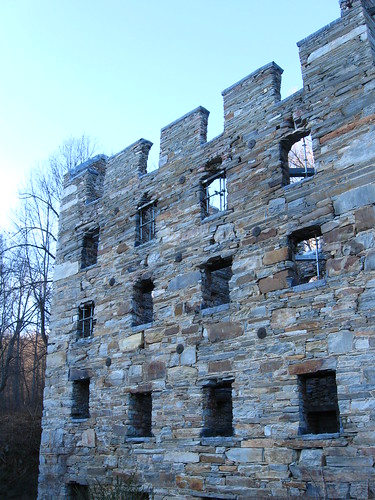
Beverley Mill, also known as Chapman Mill, is a historic grist mill located near Broad Run, Virginia.
Photo by Bob Kirchman.
Homage to the Inklings
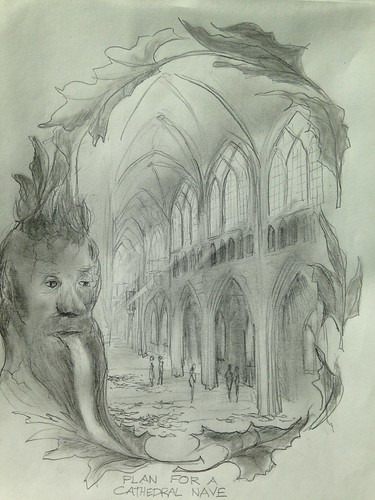
Homage to the Inklings. Sketch by Bob Kirchman.
'No Fishin''
Painting by Kristina Elaine Greer
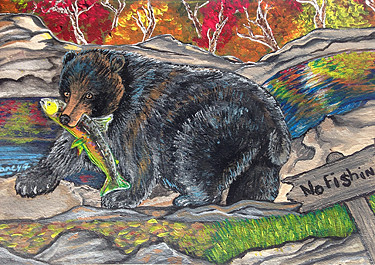
This painting reminds me of a wonderful hike up Jeremy's Run in Shenandoah National Park. I saw a large solitary bear (probably male) in the stream. Further up stream I saw a mother with two cubs. The cubs were play boxing with each other.
'The Apprentice'
Benjamin Banneker's Amazing Accomplishments
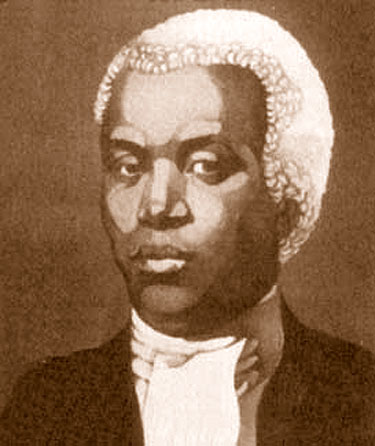
Benjamin Banneker was a renaissance man.
"You're Fired"
A Milestone Monday Feature:
The story of Benjamin Banneker is forever intertwined with the planning of our nation's capital city. In 1791 Banneker was in the employment of Andrew Ellicott, who was charged with the task of laying out the monumental city plan concieved by French architect Pierre Charles de L'Enfant, who had been hired to design a capital suitable for the new republic.
L'Enfant based his design on the best traditions of Baroque landscape design and his creation resembled the hunting gardens of Louis XIV's massive palace at Versailles. L'Enfant proved to be very difficult to work with... America's first 'rock star' architect, you might say. George Washington fired him.
Here the traditional story says that L'Enfant rolled up his drawings and left the young country in a huff, taking his designs with him. Ellicott turned to Banneker, who had prepared the actual surveys, and Banneker is said to have redrawn the plans from memory!
Though many modern historians doubt that Banneker recreated the plans from memory, the man's documented accomplishments would be in keeping with those of a man capable of such a feat.
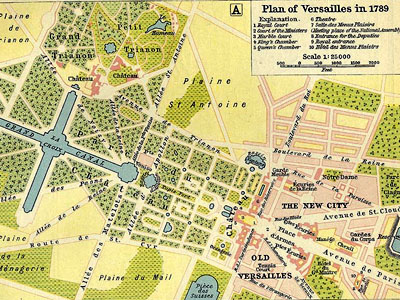
The hunting gardens of Versailles...
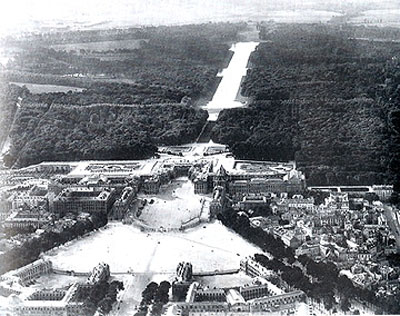
...inspiration for our nation's capital?
A simple farmer most of his life, Banneker had the good fortune to know the Quaker settlers of Ellicott's Mills in Maryland. The Society of Friends believed in providing basic education to all people and young Banneker certainly received a solid basic education.
Banneker became a student of astronomy and published an almanac. He corresponded with President Thomas Jefferson on the issue of the status of his fellow African Americans. His letter to Jefferson is well crafted, invoking reason as well as compassion. It appears that Banneker took up the craft of surveying in his fifties, looking to a time when he might be physically too old to farm.
Banneker is said to have observed the workings of a clock and then carved his own working clock mechanism from scrap wood. He published his almanac until 1802.
Banneker lived for four years after his almanacs discontinued. He published a treatise on bees, did a mathematical study on the cycle of the seventeen-year locust, and became a pamphleteer for the anti-slavery movement. He continued scientific studies by night and walked his land by day. He also continued to keep his garden. He hosted many distinguished scientists and artists of his day, and his visitors commented on his intelligence and on his knowledge of everything of importance that was happening in the country. As always, he remained precise and reflective in his conversations with others. His last walk (with a friend) came on October 9, 1806, he complained of being ill and went home to rest on his couch. He died later that day." [1.]
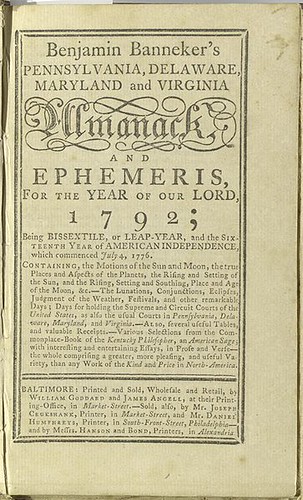
Banneker's Almanac.
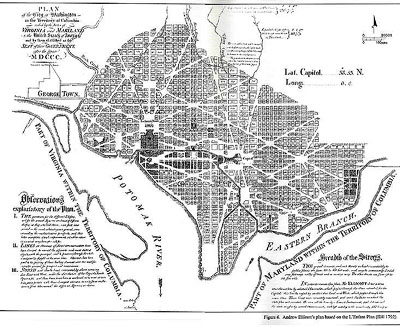
The Ellicott/Banneker map of Washington.
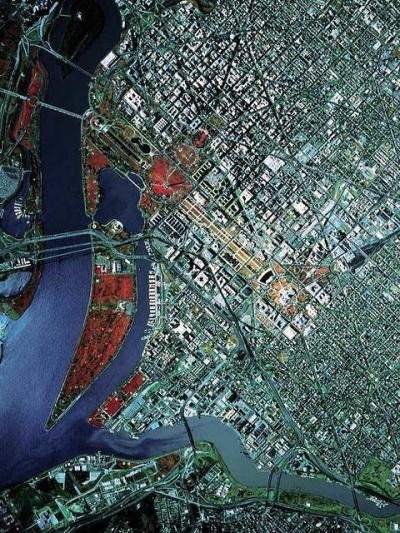
The city today.
1791 Letter to Jefferson
To Thomas Jefferson from Benjamin Banneker,
19 August 1791
From Benjamin Banneker
Maryland. Baltimore County. Near Ellicotts Lower Mills
August 19th: 1791
SIR
I am fully sensible of the greatness of that freedom which I take with you on the present occasion; a liberty which Seemed to me scarcely allowable, when I reflected on that distinguished, and dignifyed station in which you Stand; and the almost general prejudice and prepossession which is so prevailent in the world against those of my complexion. I suppose it is a truth too well attested to you, to need a proof here, that we are a race of Beings who have long laboured under the abuse and censure of the world, that we have long been looked upon with an eye of contempt, and1 that we have long been considered rather as brutish than human, and Scarcely capable of mental endowments.
Sir I hope I may Safely admit, in consequence of that report which hath reached me, that you are a man far less inflexible in Sentiments of this nature, than many others, that you are measurably friendly and well disposed toward us, and that you are willing and ready to Lend your aid and assistance to our relief from those many distresses and numerous calamities to which we are reduced.
Now Sir if this is founded in truth, I apprehend you will readily embrace every opportunity to eradicate that train of absurd and false ideas and oppinions which so generally prevails with respect to us, and that your Sentiments are concurrent with mine, which are that one universal Father hath given being to us all, and that he hath not only made us all of one flesh, but that he hath also without partiality afforded us all the Same Sensations, and endued us all with the same faculties, and that however variable we may be in Society or religion, however diversifyed in Situation or colour, we are all of the Same Family, and Stand in the Same relation to him.
Sir, if these are Sentiments of which you are fully persuaded, I hope you cannot but acknowledge, that it is the indispensible duty of those who maintain for themselves the rights of human nature, and who profess the obligations of Christianity, to extend their power and influence to the relief of every part of the human race, from whatever burthen or oppression they may unjustly labour under, and this I apprehend a full conviction of the truth and obligation of these principles should lead all to. Sir, I have long been convinced, that if your love for your Selves, and for those inesteemable laws which preserve to you the rights of human nature, was founded on Sincerity, you could not but be Solicitous, that every Individual of whatsoever rank or distinction, might with you equally enjoy the blessings thereof, neither could you rest Satisfyed, short of the most active diffusion of your exertions, in order to their promotion from any State of degradation, to which the unjustifyable cruelty and barbarism of men may have reduced them.
Sir I freely and Chearfully acknowledge, that I am of the African race, and in that colour which is natural to them of the deepest dye, and it is under a Sense of the most profound gratitude to the Supreme Ruler of the universe, that I now confess to you, that I am not under that State of tyrannical thraldom, and inhuman captivity, to which too many of my brethren are doomed; but that I have abundantly tasted of the fruition of those blessings which proceed from that free and unequalled liberty with which you are favoured and which I hope you will willingly allow you have received from the immediate hand of that Being, from whom proceedeth every good and perfect gift.
Sir, Suffer me to recall to your mind that time in which the Arms and tyranny of the British Crown were exerted with every powerful effort in order to reduce you to a State of Servitude, look back I intreat you on the variety of dangers to which you were exposed, reflect on that time in which every human aid appeared unavailable, and in which even hope and fortitude wore the aspect of inability to the Conflict, and you cannot but be led to a Serious and grateful Sense of your miraculous and providential preservation; you cannot but acknowledge, that the present freedom and tranquility which you enjoy you have mercifully received, and that it is the peculiar blessing of Heaven. This Sir, was a time in which you clearly saw into the injustice of a State of Slavery, and in which you had just apprehensions of the horrors of its condition, it was now Sir, that your abhorrence thereof was so excited, that you publickly held forth this true and invaluable doctrine, which is worthy to be recorded and remember’d in all Succeeding ages. “We hold these truths to be Self evident, that all men are created equal, and that they are endowed by their creator with certain unalienable rights, that among these are life, liberty, and the pursuit of happyness.”
Here Sir, was a time in which your tender feelings for your selves had engaged you thus to declare, you were then impressed with proper ideas of the great valuation of liberty, and the free possession of those blessings to which you were entitled by nature; but Sir how pitiable is it to reflect, that altho you were so fully convinced of the benevolence of the Father of mankind, and of his equal and impartial distribution of those rights and privileges which he had conferred upon them, that you should at the Same time counteract his mercies, in detaining by fraud and violence so numerous a part of my brethren under groaning captivity and cruel oppression, that you should at the Same time be found guilty of that most criminal act, which you professedly detested in others, with respect to yourselves.
Sir, I suppose that your knowledge of the situation of my brethren is too extensive to need a recital here; neither shall I presume to prescribe methods by which they may be relieved; otherwise than by recommending to you and all others, to wean yourselves from these narrow prejudices which you have imbibed with respect to them, and as Job proposed to his friends “Put your Souls in their Souls stead,” thus shall your hearts be enlarged with kindness and benevolence toward them, and thus shall you need neither the direction of myself or others in what manner to proceed herein.
And now, Sir, altho my Sympathy and affection for my brethren hath caused my enlargement thus far, I ardently hope that your candour and generosity will plead with you in my behalf, when I make known to you, that it was not originally my design; but that having taken up my pen in order to direct to you as a present, a copy of an Almanack which I have calculated for the Succeeding year, I was unexpectedly and unavoidably led thereto. This calculation, Sir, is the production of my arduous Study in this my advanced Stage of life; for having long had unbounded desires to become acquainted with the Secrets of nature, I have had to gratify my curiosity herein thro my own assiduous application to Astronomical Study, in which I need not to recount to you the many difficulties and disadvantages which I have had to encounter.
And altho I had almost declined to make my calculation for the ensuing year, in consequence of that time which I had allotted therefor being taking up at the Federal Territory by the request of Mr. Andrew Ellicott, yet finding myself under Several engagements to printers of this state to whom I had communicated my design, on my return to my place of residence, I industriously apply’d myself thereto, which I hope I have accomplished with correctness and accuracy, a copy of which I have taken the liberty to direct to you, and which I humbly request you will favourably receive, and altho you may have the opportunity of perusing it after its publication, yet I chose to send it to you in manuscript previous thereto, that thereby you might not only have an earlier inspection, but that you might also view it in my own hand writing.—And now Sir, I shall conclude and Subscribe my Self with the most profound respect your most Obedient humble Servant,
BENJAMIN BANNEKER
NB any communication to me may be had by a direction to Mr. Elias Ellicott merchant in Baltimore Town.
B B
As an Essay of my calculation is put into the hand of Mr. Cruckshank of philadelphia, for publication I would wish that you might neither have this Almanack copy published nor give any printer an opportunity thereof, as it might tend to disappoint Mr. Joseph Cruckshank in his sale. [2.]
It's Fall Y'all
Painting by Savhanna Herndon
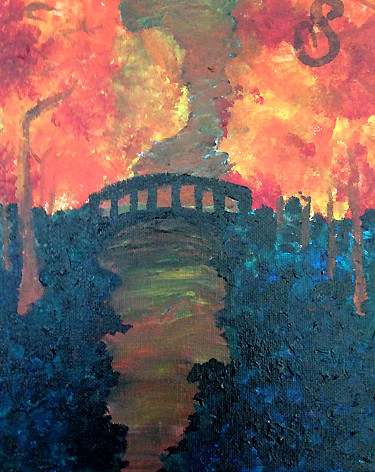
A Japanese bridge on a crisp Autumn day! Inviting!
THYME Magazine · Post Phantasies, C. S. Lewis, George MacDonald Posting as Bob K. Citizen Journalism with a Better Flavor
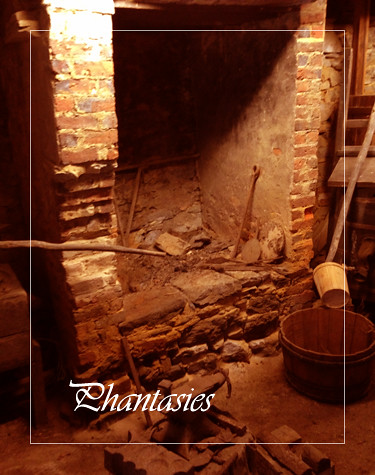
Volume XVI, Issue XIa
Phantasies
By George MacDonald, Chapter 20
Thou hadst no fame; that which thou didst like good
Was but thy appetite that swayed thy blood
For that time to the best; for as a blast
That through a house comes, usually doth cast
Things out of order, yet by chance may come
And blow some one thing to his proper room,
So did thy appetite, and not thy zeal,
Sway thee by chance to do some one thing well."
~ from John Fletcher's "Faithful Shepherdess".
The noble hart that harbours vertuous thought
And is with childe of glorious great intent,
Can never rest, until it forth have brought
Th' eternall brood of glorie excellent."
~ from Edmund Spenser's "The Faerie Queene".
I had not gone very far before I felt that the turf beneath my feet was soaked with the rising waters. But I reached the isthmus in safety. It was rocky, and so much higher than the level of the peninsula, that I had plenty of time to cross. I saw on each side of me the water rising rapidly, altogether without wind, or violent motion, or broken waves, but as if a slow strong fire were glowing beneath it. Ascending a steep acclivity, I found myself at last in an open, rocky country. After travelling for some hours, as nearly in a straight line as I could, I arrived at a lonely tower, built on the top of a little hill, which overlooked the whole neighbouring country. As I approached, I heard the clang of an anvil; and so rapid were the blows, that I despaired of making myself heard till a pause in the work should ensue. It was some minutes before a cessation took place; but when it did, I knocked loudly, and had not long to wait; for, a moment after, the door was partly opened by a noble-looking youth, half-undressed, glowing with heat, and begrimed with the blackness of the forge. In one hand he held a sword, so lately from the furnace that it yet shone with a dull fire. As soon as he saw me, he threw the door wide open, and standing aside, invited me very cordially to enter. I did so; when he shut and bolted the door most carefully, and then led the way inwards. He brought me into a rude hall, which seemed to occupy almost the whole of the ground floor of the little tower, and which I saw was now being used as a workshop. A huge fire roared on the hearth, beside which was an anvil. By the anvil stood, in similar undress, and in a waiting attitude, hammer in hand, a second youth, tall as the former, but far more slightly built. Reversing the usual course of perception in such meetings, I thought them, at first sight, very unlike; and at the second glance, knew that they were brothers. The former, and apparently the elder, was muscular and dark, with curling hair, and large hazel eyes, which sometimes grew wondrously soft. The second was slender and fair, yet with a countenance like an eagle, and an eye which, though pale blue, shone with an almost fierce expression. He stood erect, as if looking from a lofty mountain crag, over a vast plain outstretched below. As soon as we entered the hall, the elder turned to me, and I saw that a glow of satisfaction shone on both their faces. To my surprise and great pleasure, he addressed me thus:
Brother, will you sit by the fire and rest, till we finish this part of our work?"
I signified my assent; and, resolved to await any disclosure they might be inclined to make, seated myself in silence near the hearth.
The elder brother then laid the sword in the fire, covered it well over, and when it had attained a sufficient degree of heat, drew it out and laid it on the anvil, moving it carefully about, while the younger, with a succession of quick smart blows, appeared either to be welding it, or hammering one part of it to a consenting shape with the rest. Having finished, they laid it carefully in the fire; and, when it was very hot indeed, plunged it into a vessel full of some liquid, whence a blue flame sprang upwards, as the glowing steel entered.
There they left it; and drawing two stools to the fire, sat down, one on each side of me.
We are very glad to see you, brother. We have been expecting you for some days," said the dark-haired youth.
I am proud to be called your brother," I rejoined; "and you will not think I refuse the name, if I desire to know why you honour me with it?"
Ah! then he does not know about it," said the younger. "We thought you had known of the bond betwixt us, and the work we have to do together. You must tell him, brother, from the first."
So the elder began:
Our father is king of this country. Before we were born, three giant brothers had appeared in the land. No one knew exactly when, and no one had the least idea whence they came. They took possession of a ruined castle that had stood unchanged and unoccupied within the memory of any of the country people. The vaults of this castle had remained uninjured by time, and these, I presume, they made use of at first. They were rarely seen, and never offered the least injury to any one; so that they were regarded in the neighbourhood as at least perfectly harmless, if not rather benevolent beings. But it began to be observed, that the old castle had assumed somehow or other, no one knew when or how, a somewhat different look from what it used to have. Not only were several breaches in the lower part of the walls built up, but actually some of the battlements which yet stood, had been repaired, apparently to prevent them from falling into worse decay, while the more important parts were being restored. Of course, every one supposed the giants must have a hand in the work, but no one ever saw them engaged in it. The peasants became yet more uneasy, after one, who had concealed himself, and watched all night, in the neighbourhood of the castle, reported that he had seen, in full moonlight, the three huge giants working with might and main, all night long, restoring to their former position some massive stones, formerly steps of a grand turnpike stair, a great portion of which had long since fallen, along with part of the wall of the round tower in which it had been built. This wall they were completing, foot by foot, along with the stair. But the people said they had no just pretext for interfering: although the real reason for letting the giants alone was, that everybody was far too much afraid of them to interrupt them.
At length, with the help of a neighbouring quarry, the whole of the external wall of the castle was finished. And now the country folks were in greater fear than before. But for several years the giants remained very peaceful. The reason of this was afterwards supposed to be the fact, that they were distantly related to several good people in the country; for, as long as these lived, they remained quiet; but as soon as they were all dead the real nature of the giants broke out. Having completed the outside of their castle, they proceeded, by spoiling the country houses around them, to make a quiet luxurious provision for their comfort within. Affairs reached such a pass, that the news of their robberies came to my father's ears; but he, alas! was so crippled in his resources, by a war he was carrying on with a neighbouring prince, that he could only spare a very few men, to attempt the capture of their stronghold. Upon these the giants issued in the night, and slew every man of them. And now, grown bolder by success and impunity, they no longer confined their depredations to property, but began to seize the persons of their distinguished neighbours, knights and ladies, and hold them in durance, the misery of which was heightened by all manner of indignity, until they were redeemed by their friends, at an exorbitant ransom. Many knights have adventured their overthrow, but to their own instead; for they have all been slain, or captured, or forced to make a hasty retreat. To crown their enormities, if any man now attempts their destruction, they, immediately upon his defeat, put one or more of their captives to a shameful death, on a turret in sight of all passers-by; so that they have been much less molested of late; and we, although we have burned, for years, to attack these demons and destroy them, dared not, for the sake of their captives, risk the adventure, before we should have reached at least our earliest manhood. Now, however, we are preparing for the attempt; and the grounds of this preparation are these. Having only the resolution, and not the experience necessary for the undertaking, we went and consulted a lonely woman of wisdom, who lives not very far from here, in the direction of the quarter from which you have come. She received us most kindly, and gave us what seems to us the best of advice. She first inquired what experience we had had in arms. We told her we had been well exercised from our boyhood, and for some years had kept ourselves in constant practice, with a view to this necessity.
But you have not actually fought for life and death?' said she.
We were forced to confess we had not.
So much the better in some respects,' she replied. 'Now listen to me. Go first and work with an armourer, for as long time as you find needful to obtain a knowledge of his craft; which will not be long, seeing your hearts will be all in the work. Then go to some lonely tower, you two alone. Receive no visits from man or woman. There forge for yourselves every piece of armour that you wish to wear, or to use, in your coming encounter. And keep up your exercises.
As, however, two of you can be no match for the three giants, I will find you, if I can, a third brother, who will take on himself the third share of the fight, and the preparation. Indeed, I have already seen one who will, I think, be the very man for your fellowship, but it will be some time before he comes to me. He is wandering now without an aim. I will show him to you in a glass, and, when he comes, you will know him at once. If he will share your endeavours, you must teach him all you know, and he will repay you well, in present song, and in future deeds.'
She opened the door of a curious old cabinet that stood in the room. On the inside of this door was an oval convex mirror. Looking in it for some time, we at length saw reflected the place where we stood, and the old dame seated in her chair. Our forms were not reflected. But at the feet of the dame lay a young man, yourself, weeping.
Surely this youth will not serve our ends,' said I, 'for he weeps.'
The old woman smiled. 'Past tears are present strength,' said she.
Oh!' said my brother, 'I saw you weep once over an eagle you shot.'
That was because it was so like you, brother,' I replied; 'but indeed, this youth may have better cause for tears than that--I was wrong.'
Wait a while,' said the woman; 'if I mistake not, he will make you weep till your tears are dry for ever. Tears are the only cure for weeping. And you may have need of the cure, before you go forth to fight the giants. You must wait for him, in your tower, till he comes.'
Now if you will join us, we will soon teach you to make your armour; and we will fight together, and work together, and love each other as never three loved before. And you will sing to us, will you not?"
That I will, when I can," I answered; "but it is only at times that the power of song comes upon me. For that I must wait; but I have a feeling that if I work well, song will not be far off to enliven the labour."
This was all the compact made: the brothers required nothing more, and I did not think of giving anything more. I rose, and threw off my upper garments.
I know the uses of the sword," I said. "I am ashamed of my white hands beside yours so nobly soiled and hard; but that shame will soon be wiped away."
No, no; we will not work to-day. Rest is as needful as toil. Bring the wine, brother; it is your turn to serve to-day."
The younger brother soon covered a table with rough viands, but good wine; and we ate and drank heartily, beside our work. Before the meal was over, I had learned all their story. Each had something in his heart which made the conviction, that he would victoriously perish in the coming conflict, a real sorrow to him. Otherwise they thought they would have lived enough. The causes of their trouble were respectively these:
While they wrought with an armourer, in a city famed for workmanship in steel and silver, the elder had fallen in love with a lady as far beneath him in real rank, as she was above the station he had as apprentice to an armourer. Nor did he seek to further his suit by discovering himself; but there was simply so much manhood about him, that no one ever thought of rank when in his company. This is what his brother said about it. The lady could not help loving him in return. He told her when he left her, that he had a perilous adventure before him, and that when it was achieved, she would either see him return to claim her, or hear that he had died with honour. The younger brother's grief arose from the fact, that, if they were both slain, his old father, the king, would be childless. His love for his father was so exceeding, that to one unable to sympathise with it, it would have appeared extravagant. Both loved him equally at heart; but the love of the younger had been more developed, because his thoughts and anxieties had not been otherwise occupied. When at home, he had been his constant companion; and, of late, had ministered to the infirmities of his growing age. The youth was never weary of listening to the tales of his sire's youthful adventures; and had not yet in the smallest degree lost the conviction, that his father was the greatest man in the world. The grandest triumph possible to his conception was, to return to his father, laden with the spoils of one of the hated giants. But they both were in some dread, lest the thought of the loneliness of these two might occur to them, in the moment when decision was most necessary, and disturb, in some degree, the self-possession requisite for the success of their attempt. For, as I have said, they were yet untried in actual conflict. "Now," thought I, "I see to what the powers of my gift must minister." For my own part, I did not dread death, for I had nothing to care to live for; but I dreaded the encounter because of the responsibility connected with it. I resolved however to work hard, and thus grow cool, and quick, and forceful.
The time passed away in work and song, in talk and ramble, in friendly fight and brotherly aid. I would not forge for myself armour of heavy mail like theirs, for I was not so powerful as they, and depended more for any success I might secure, upon nimbleness of motion, certainty of eye, and ready response of hand. Therefore I began to make for myself a shirt of steel plates and rings; which work, while more troublesome, was better suited to me than the heavier labour. Much assistance did the brothers give me, even after, by their instructions, I was able to make some progress alone. Their work was in a moment abandoned, to render any required aid to mine. As the old woman had promised, I tried to repay them with song; and many were the tears they both shed over my ballads and dirges. The songs they liked best to hear were two which I made for them. They were not half so good as many others I knew, especially some I had learned from the wise woman in the cottage; but what comes nearest to our needs we like the best.
I
The king sat on his throne
Glowing in gold and red;
The crown in his right hand shone,
And the gray hairs crowned his head.
His only son walks in,
And in walls of steel he stands:
Make me, O father, strong to win,
With the blessing of holy hands."
He knelt before his sire,
Who blessed him with feeble smile
His eyes shone out with a kingly fire,
But his old lips quivered the while.
Go to the fight, my son,
Bring back the giant's head;
And the crown with which my brows have done,
Shall glitter on thine instead."
My father, I seek no crowns,
But unspoken praise from thee;
For thy people's good, and thy renown,
I will die to set them free."
The king sat down and waited there,
And rose not, night nor day;
Till a sound of shouting filled the air,
And cries of a sore dismay.
Then like a king he sat once more,
With the crown upon his head;
And up to the throne the people bore
A mighty giant dead.
And up to the throne the people bore
A pale and lifeless boy.
The king rose up like a prophet of yore,
In a lofty, deathlike joy.
He put the crown on the chilly brow:
"Thou should'st have reigned with me
But Death is the king of both, and now
I go to obey with thee.
Surely some good in me there lay,
To beget the noble one."
The old man smiled like a winter day,
And fell beside his son.
II
O lady, thy lover is dead," they cried;
"He is dead, but hath slain the foe;
He hath left his name to be magnified
In a song of wonder and woe."
Alas! I am well repaid," said she,
With a pain that stings like joy:
For I feared, from his tenderness to me,
That he was but a feeble boy.
Now I shall hold my head on high,
The queen among my kind;
If ye hear a sound, 'tis only a sigh
For a glory left behind."
The first three times I sang these songs they both wept passionately. But after the third time, they wept no more. Their eyes shone, and their faces grew pale, but they never wept at any of my songs again.
(to be continued)
Le Château de St. Albain
Photos by Bob Kirchman
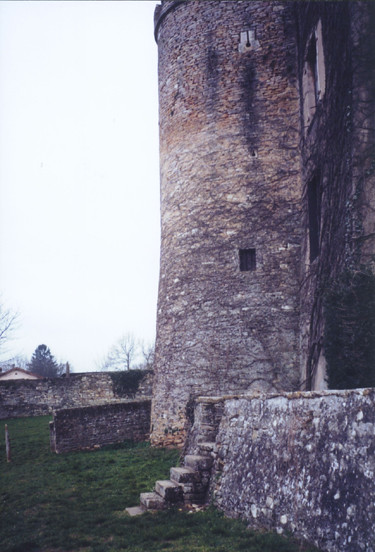
The Tower. Photo by Bob Kirchman.
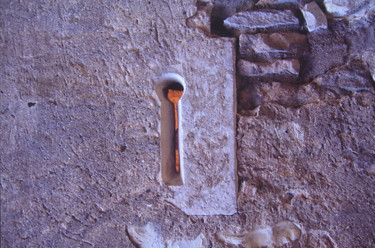
Archer Slit. Photo by Bob Kirchman.
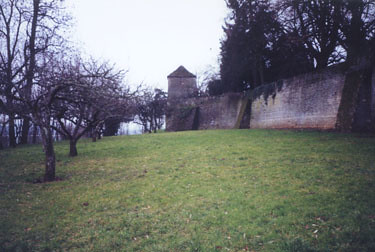
Outer Wall. Photo by Bob Kirchman.
The tower and some of the walls survived the French Revolution and the Schweitzer family once lived here, including the grandparents and the mother of French philosopher, playwright, novelist, political activist, biographer, and literary critic Jean Paul Sartre.
Himeji 姫路市
Photos by Bob Kirchman

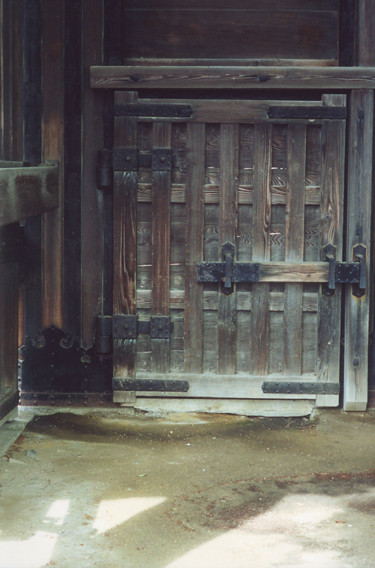
Photos by Bob Kirchman.
In 1333, Akamatsu Norimura first built a fort on top of Himeyama hill. The fort was dismantled and rebuilt as Himeyama Castle in 1346, and then remodeled into Himeji Castle two centuries later. Himeji Castle was then significantly remodeled in 1581 by Toyotomi Hideyoshi, who added a three-story castle keep. In 1600, Tokugawa Ieyasu awarded the castle to Ikeda Terumasa for his help in the Battle of Sekigahara, and Ikeda completely rebuilt the castle from 1601 to 1609, expanding it into a large castle complex. Several buildings were later added to the castle complex by Honda Tadamasa from 1617 to 1618. For over 400 years, Himeji Castle has remained intact, even throughout the extensive bombing of Himeji in World War II, and natural disasters such as the 1995 Great Hanshin earthquake.
C. S. Lewis's Timely Message
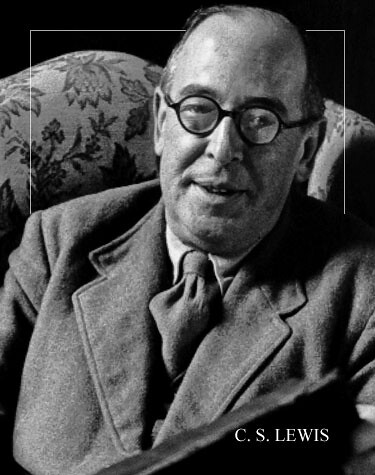
Lewis has a powerful message for our time.
Many of us are quite frustrated as we try to convey the notion that there are greater realities. There are those who stand in solidarity on this and there are those who pretty much see 'truth' as a matter of what they believe about something, saying: "That may be right for you, but what I believe is right for me." Absent from the discussion is the notion that a position might be guided by higher... even DIVINE principles. Might it surprise you that this assault on the notion of 'absolute truth' is not new? What if we find that it influenced the thinkers and textbook writers decades ago... even the work of journalists such as H. L. Mencken, who pretty much eviscerated the victory of William Jennings Bryan in the Scopes Trial.
Hillsdale College in Michigan presents a fascinating series of lectures on the work and vision of C. S. Lewis. All of us who wish to speak of deeper realities into our culture need to avail ourselves of this great resource!

Dr. Larry Arrn, President of Hillsdale College, begins the series with a talk on two of Lewis's works, The Abolition of Man and That Hideous Strength.


Blue Ridge Parkway Stonework
Photos by Bob Kirchman
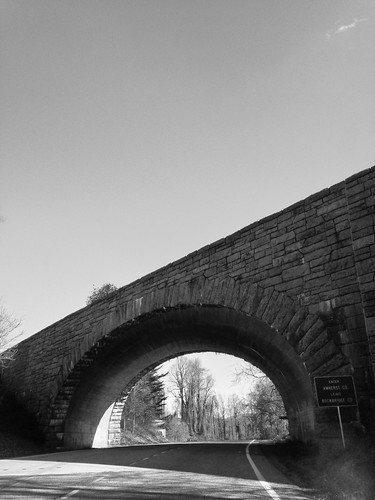
The Bridge over Route 60.
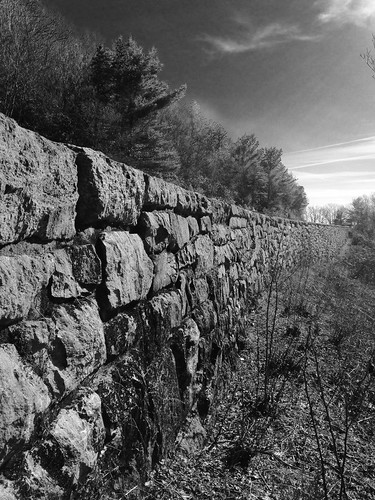
Italian and Spanish stonemasons built these walls and bridges...
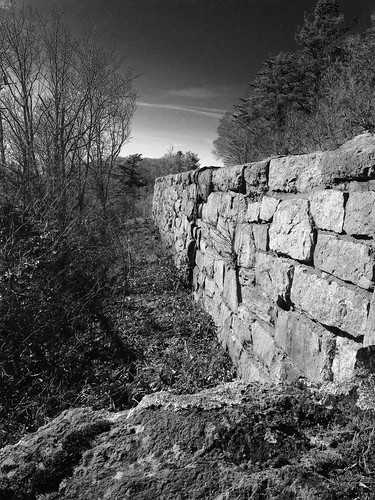
...which are often incorrectly attributed to CCC workers.
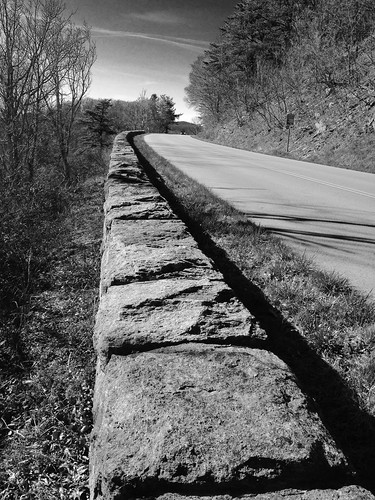
Photos by Bob Kirchman.
C. S. Lewis and MacDonald
I was brought back… (from atheism to Christianity) by the strong influence of two writers, the Presbyterian George MacDonald and the Roman Catholic G. K. Chesterton.” – C. S. Lewis
In his novel, The Great Divorce, C. S. Lewis describes an fictional trip to Heaven where George MacDonald serves as his guide: “I tried, trembling, to tell this man all that his writing had done for me. I tried to tell how a certain frosty afternoon at Leatherhead Station when I first bought a copy of Phantasies (being then about sixteen years old) had been to me what the first sight of Beatrice had been to Dante: Here begins the New Life. I tried to confess how long that life had delayed in the region of imagination merely: how slowly and reluctantly I had come to admit that his Christendom had more than an accidental connection with it, how hard I had tried not to see that the true name of this quality which first met me in his books is Holiness.”
This week’s excerpt from Phantasies and next week’s impress me most particularly as being the type of writing that must have stirred something in young Lewis that would not be satisfied until it found its completeness in the Gospel of Jesus Christ. That MacDonald could dig so deeply into essential humanness is worthy of reflection. That he stirred that awakening in a man who is arguably the Twentieth Century’s greatest apologist is worthy of serious study. Before Marianne Wright compiled her excellent collection of MacDonald excerpts, Lewis published a collection of MacDonald excerpts as well. In introduction Lewis wrote: “In making this collection I was discharging a debt of justice. I have never concealed the fact that I regarded him as my master; indeed I fancy I have never written a book in which I did not quote from him. But it has not seemed to me that those who have received my books kindly take even now sufficient notice of the affiliation. Honesty drives me to emphasize it.”
Vincent van Gogh
The Man You Don't Know
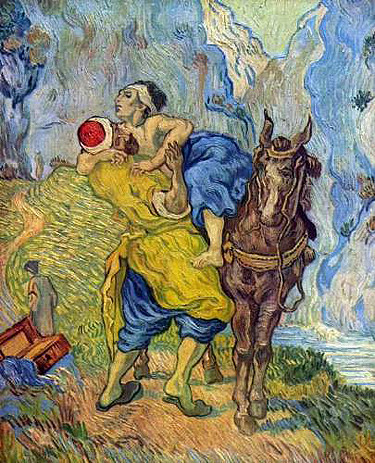
The Good Samaritan, Vincent van Gogh, 1890
Be clearly aware of the stars and infinity on high. Then life seems almost enchanted after all.”
― Vincent van Gogh
Most of us know something of the story of the great Post-impressionist. In the April 2, 2019 issue of THYME, we will explore his life and discover some surprising things about the man!
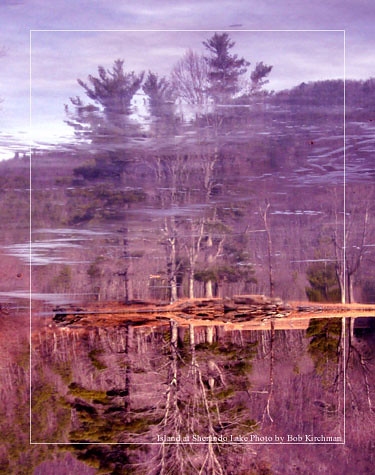
Sherando Lake. Photo by Bob Kirchman.
A Case for Vision
© 2019 The Kirchman Studio.
Our nation is in need of an I. K. Brunel's vision today. Our situation is no less dire than that of Bristol in the Nineteenth Century and we need to find direction, both in spirit and economically, if we are to emerge successfully. [1.] Looking at what is happening in North Dakota it is imperative that we find similar opportunity for people in every state of the union. Where shall we look for a vision of the future? Certainly not to an administration that sees massive unemployment and underemployment as a good thing! Many of us have seen our hopes and dreams take a serious hit from the policies of this administration. The marketplace has less resources available to support the creative endeavors we are now supposedly 'free' to pursue. Just ask anyone actually selling fine art these days. People need to be making money in order to spend it! If you are looking to the National Endowment for the Arts to fund your work, guess what? Diminishing tax revenues means less money to fund 'public' art. In fact, the government will be hard pressed to meet obligations such as Social Security and Medicare.
The last administration had no intention of encouraging the true creative sector in this country. In fact, it has became quite clear that they WANTED us discouraged. Our discouragement was essential for them to implement their 'fundamental change' to the country we live in. That is why we must not succumb. I would like to, in the spirit of Theodor Herzl's Aultneuland, give you reason for hope and reason to stay in the fight as well! Herzl was a man with a vision. In Altneuland he was spot-on in describing the nation that was born, or reborn, if you will in the creation of modern day Israel. When Herzl wrote his novel the land was securely in the hands of the Ottoman Empire. In 1917 England's foreign secretary Arthur Balfour wrote a declaration stating that this land should indeed be given as a homeland to the people who had inhabited it since ancient times. World War I saw the end of the empire and British control. It wasn't until 1947 that Israel was truly 'reborn' in the wake of that terrible war.
So, it is essential for us in our time to keep the vision alive that created our own republic. We need to teach our young people, instructing them in the Faith and values that are the true foundation of America's remarkable story. Just like Bristol, England in the Nineteenth Century, we need to look beyond our immediate boundaries and see new possibilities. I believe that ultimately the unseen hand of creativity and human ingenuity can prevail. Will we live to see new wonders? I believe in G-d. I believe in inspiration, and I believe in Imago Dei... the knowledge that in creation G-d did indeed give mankind a small spark of His own creative energy. When Samuel Morse telegraphed: "What hath G-d wrought?" he was correct in his attribution even as he worked with his own hands to make the device. Now we need to be open to the same sort of inspiration. There are things we can make again (or for the first time)!
Consider the more recent story of R. G. LeTourneau, who's company had been awarded a contract to build a machine to lift airplanes by the government during the great war. No one had ever built such a machine before, and the engineers were stumped. Wednesday evening rolled around and LeTourneau announced to his stunned team that he was going to a prayer meeting. "But, sir,... We've got a deadline on this thing!" The great industrialist replied: "But I have a deadline with G-d." LeTourneau went to the prayer meeting. He sang praises and poured out his heart in earnest prayer. He said that walking back to his office from the prayer meeting, he 'saw' the design he was seeking for the machine clearly in his head! What if a modern-day Brunel were indeed to create new dorways for American commerce, as American ingenuity continues to finds new sources for energy to power that commerce. Just think, new geothermal resources powering new frontiers in American inventiveness.
I, for one, refuse to believe that the age of inspiration is past. I do believe that it is essential that we return to the roots of Faith and freedom that have given birth to the American experiment and sustained it. It is not enough to be brilliant in business if we squander the return it gives us in a false sense of entitlement: "For unto whomsoever much is given, of him shall be much required." -- Luke 12:8 So, come with me, in the spirit of Aultneuland, to an America not too far in the distant future. Let us visit a land where a greater vision prevails than simply profit or personal reward. In my youth we once rode the train into Philadelphia from Baltimore. At the time, when you entered into Pennsylvania from Delaware, you were greeted by a large sign that read: "What Chester Makes Makes Chester." The city of Chester was at the time a center of manufacturing and it indeed saw itself in terms of its contributions to the world.
Would that we would see ourselves as contributors to the world once more! If Herzl were to step into his beloved Zion today, he would be amazed to see the center of advanced technology she has become. He would wonder at technologies being developed there that might one day give sight to the blind! Though he forsaw them, the modern cities such as Tel Aviv would still astound him! He would see the amazing works of irrigation that have made Israel the garden state of the world. The flowers we had at our wedding in 1980 came in boxes that proudly proclaimed that they were grown in Israel. Abraham the Patriarch was given the promise in Genesis 22:18: "And in thy seed shall all the nations of the earth be blessed; because thou hast obeyed my voice." What wonderful contributions might we as a people make to the world if we will ourselves heed the voice of the One who created creativity itself?
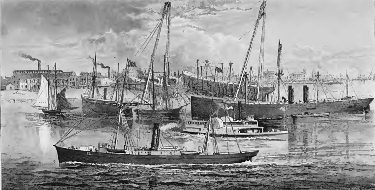
The waterfront of Chester, Pennsylvania in 1875.
Spring 2019 Areopagus Lecture
They taught me longing - Sehnsucht; made me for good or ill, and before I was six years old, a votary of the Blue Flower.”
— C. S. Lewis, Surprised by Joy
We are pleased to announce that theologian Alison Milbank will be presenting the next Areopagus Lecture. Dr. Milbank’s talk will address the formation of the imagination as part of the vocation of the Church. Alison Milbank was a guest on the MARS HILL AUDIO Journal on Volume 99 when she talked about her book Chesterton and Tolkien as Theologians. She is a professor in the department of theology and religious studies at the University of Nottingham.
Christian apologetics is often understood as a rational defense of belief presented to unbelievers on grounds other than faith. As John Milbank has put it in his forward to Imaginative Apologetics, these grounds reside “on one’s opponent’s territory, where one risks remaining in a weak or even a false position.” In other words, reasons and rationality are understood in terms already inclined to make belief in transcendence less plausible. What if, however, the “apology” offered remained intact and faithful to its original setting? What if the defense of truth relied on the conditions of goodness and beauty?
The famous apologist and fantasy writer, C. S. Lewis wrote that “reason is the natural organ of truth; but imagination is the organ of meaning. Imagination, producing new metaphors or revivifying old, is not the cause of truth, but its condition.” In other statements and in his poem “Reason,” Lewis suggests that not only are reason and imagination distinct from each other, but that they are opposed and that we experience this opposition internally as in irreconcilable tension. How is it that such a superb writer of imaginative fiction seems to maintain a contradictory view of imagination in his non-fiction? Are we to take Lewis’s more direct statements about the imagination literally? Or can the imagination — and Lewis’s admitted love for beauty and longing — be incorporated into our understanding of reason and rationality?
In her talk, Alison Milbank will investigate these questions in light of the transcendentals of truth, goodness, and beauty. With the help of some other thoughtful observers on the role of the imagination, Milbank will examine whether the Church can adopt an imaginative apologetic that does not deny the claims of reason.
When: April 4 at 7:30 PM
Where: The Haven - 112 West Market Street, Charlottesville, VA 29902
What: “Imaginative Apologetics beyond C. S. Lewis”
— Lecture: free and open to the public
RSVP: Please register here [click to register] for the lecture
